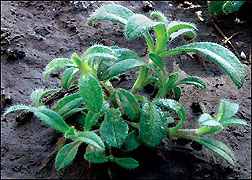
Take a drive around most southwest Missouri towns in the spring and you will see that chickweed has invaded many gardens, flower beds and yards.
Homeowners complain more about chickweed every spring, according to Jay Chism, agronomy specialist with University of Missouri Extension. Unfortunately, homeowners forget about it by fall which is when steps should be taken to get rid of it.
The good news is that it is possible to plan control strategies once you understand the life cycle of chickweed.
"Chickweed is a winter annual that germinates from seed during the fall, matures and produces seed late next spring then dies in early summer," said Chism.
In perennial flower beds, mulch will provide resistance to chickweed invasion this fall.
"A number of annual weeds like chickweed require light for germination. That means a three- or four-inch mulch layer around plants with bark mulches should provide protection against these weeds," said Chism.
In annual beds and vegetable gardens, surface compost mulch applied in the fall -- with a plan to incorporate it prior to planting next spring -- may also help prevent seed germination.
"After compost is tilled in to the garden and spring planting is completed, mulch will greatly discourage weeds. Plus, mulch provides other cultural benefits. However, don't be surprised if a few weeds sneak through. Some hand weeding may be expected," said Chism.
Winter annuals in the lawn are also common. A few dandelions, chickweed and henbit generally appear unless good cultural practices or herbicides are applied.
Good cultural practices, like a planned fertility program and a thick stand of grass, will discourage annual weeds.
"If an herbicide application is needed, the most common pre-emergence material will contain Dimension or Gallery. They must be applied before the winter annuals germinate," said Chism.
A post-emergence material like 2,4-D, Trimec or Ortho's Weed Be Gone Max can be highly effective when applied during a warm period in early November.
For more information, or answers to your specific lawn and garden questions, contact Chism, at (417) 682-3579 or the Greene County Master Gardener Hotline at (417) 862-9284.






Comments